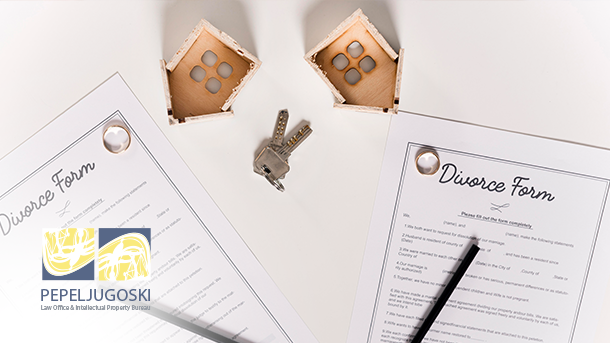According to the provisions of the Law on ownership and other real rights, the property of the spouses may be joint and separate property.
The property owned by one of the spouses at the time of concluding the marriage, shall be considered as his/her separate property, as well as the right over the property which the spouse receives on the basis of inheritance, legate and gift, as well as the things acquired during marriage which exclusively serve to satisfy the personal needs of one of the spouses, unless they have disproportionately great value compared to the value of the total joint property. Each spouse shall independently manage with, and have at disposal the separate property, unless otherwise agreed in writing by the spouses.
The property which the spouses acquire during their marriage shall be their joint property. Joint ownership is the ownership of spouses of undivided property when their parts are determinable but not predetermined. The right of ownership of spouses over the immovable considered their joint property, shall be entered in the public books in the name of the two spouses as their joint property. If only one of the spouses is entered in the public books as the owner of the joint property, it shall be considered that the entry is made in the name of both of the spouses.
During the marriage and following the termination of the marriage, the spouses may, by an agreement, divide the joint property, whereby the division of the joint property of the spouses shall result in separate property regime.
Unless agreement is reached, the division of the joint property, at the request of one of the spouses, shall be carried out by the court in a non-contentious procedure. When determining the spouses’ parts of the joint property, the court shall ground the case that the joint property of the spouses is divided into equal parts. At the request of one of the spouses, the court may assign him a larger share of the joint property, if he/she proves that his/her contribution to the joint property is obviously and significantly greater than the contribution of the other spouse.
In the course of division of the joint property, at the request of the spouse, his/her part shall primarily include those items from the joint property which serve him/her to perform his/her activity. Besides his/her part, the things acquired through work during marriage that serve exclusively for his/her personal use, shall be separated and handed to the spouse. If the value of these items is disproportionately larger compared to the value of the total joint property, division shall also be carried out to those things, unless the spouse who should receive these items compensates the other spouse with the corresponding value or the other spouse cedes him/her the things by his/her consent.
If, during the division of the joint property, it is determined that one of the spouses has a significantly smaller portion, the court may, at the request of one of the spouses, decide that that portion should be compensated in money.
The gifts that the spouses have given to each other before concluding or during marriage shall not be returned.
It is important to point out that not only the movable and immovable things acquired during the marriage are divided, but also the debts incurred during the marriage. For example, if a loan was taken for the duration of the marriage, it represents an obligation acquired during the marriage, and as such should be included in the division table.

